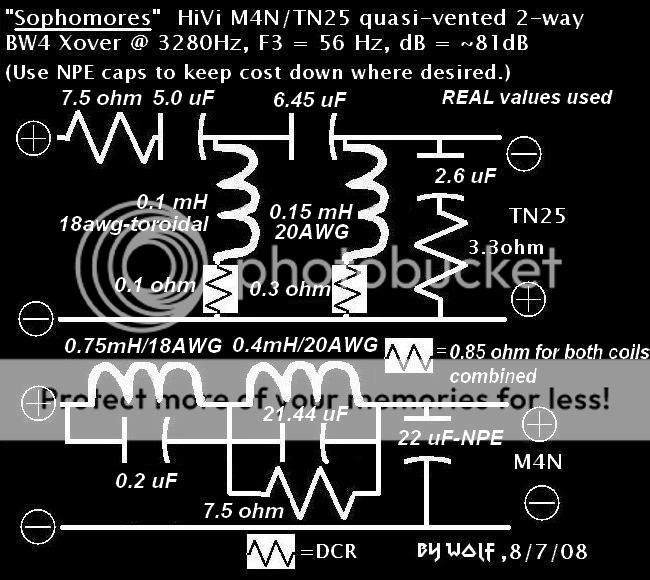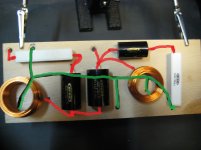... my "Golden Ears" hearing is so acute that I can hear sounds that aren't even there!
Thus your nickname around the Puget Sound area "Saint Terry O' Arc". 😛
Alright. I finally got motivated and tried to make my first crossover (for the tweeter).
Just one verification before I go any further.
In Wolf's schematic, notice the positives and negatives. On the tweeter output. I don't know much about crossovers, but is that right or wrong?

Anyway.
I haven't soldered anything or made any permanent connections. I don't mean to put you guys on the spot, but I'm looking for some verification on this circuit and whether or not it would work. I'm a horrible schematic reader no matter how much I try. But I think this is right.
Tweeter (Top schematic)

The two big holes on the left are the inputs, and the two in the middle/right are the outputs.
All connections are going to be done under the board.
Any ideas? Suggestions? Wolf? =P
Thanks.
Just one verification before I go any further.
In Wolf's schematic, notice the positives and negatives. On the tweeter output. I don't know much about crossovers, but is that right or wrong?

Anyway.
I haven't soldered anything or made any permanent connections. I don't mean to put you guys on the spot, but I'm looking for some verification on this circuit and whether or not it would work. I'm a horrible schematic reader no matter how much I try. But I think this is right.
Tweeter (Top schematic)
The two big holes on the left are the inputs, and the two in the middle/right are the outputs.
All connections are going to be done under the board.
Any ideas? Suggestions? Wolf? =P
Thanks.
Attachments
Last edited:
The tweeter is connected in reverse polarity- that is correct. It has to do with phase and the xover point and how the drivers align. It's not a +/- polarity thing really.
Just connect the tweeter in reverse and you matched my schematic really well! Nice job!
Wolf
Just connect the tweeter in reverse and you matched my schematic really well! Nice job!
Wolf
Thanks for the super quick reply!
Yeah I was just wondering if that was right. I thought it would be changed by now if it was wrong, anyway.
And you think the actual connections that I have are good to go? Awesome. I really rather not fire up the amp and then have my heart destroyed when it doesn't work. =P
Thanks!
Yeah I was just wondering if that was right. I thought it would be changed by now if it was wrong, anyway.
And you think the actual connections that I have are good to go? Awesome. I really rather not fire up the amp and then have my heart destroyed when it doesn't work. =P
Thanks!
This is mostly directed at Wolf, (if you are there), but anyone who knows anything about speakers is undoubtedly welcome...
Does it matter where the port is? I'm going for a semi-antique look on this set of speakers + amp, and I'm going to use grill cloth. I don't want to cover the port, especially if these things are moving a good amount of air...
So I need to position the port in a place where it doesn't look too dumb.
Is there an ideal place? And does it really matter?
Can I use a rear firing port? Would that work?
Does it matter where the port is? I'm going for a semi-antique look on this set of speakers + amp, and I'm going to use grill cloth. I don't want to cover the port, especially if these things are moving a good amount of air...
So I need to position the port in a place where it doesn't look too dumb.
Is there an ideal place? And does it really matter?
Can I use a rear firing port? Would that work?
Last edited:
Preferably on the back ,or in the bottom of the cabinet . Since low frequencies are omnidirectional ,the contribution of the port is for those frequencies only.
Putting it on the bottom allows some extra low pass ,depending from the height
from the floor . When it's placed on the front ,near the speakers , its output is summed directly and violently 😱
Putting it on the bottom allows some extra low pass ,depending from the height
from the floor . When it's placed on the front ,near the speakers , its output is summed directly and violently 😱
Preferably on the back ,or in the bottom of the cabinet . Since low frequencies are omnidirectional ,the contribution of the port is for those frequencies only.
Putting it on the bottom allows some extra low pass ,depending from the height
from the floor . When it's placed on the front ,near the speakers , its output is summed directly and violently 😱
Ahh...I think I might try rear firing. The ports would be around 6-8 inches from the wall. Is that too close?
Should the port be directly behind the woofer/midbass? Or....Lower...?Sorry new to this whole thing.
Thanks.
Me too ... I made my first bass reflex box about a year ago (rear firing) and another one this year ,front firing . I try to improve ,so I realized that the duct is very important ,also.
I made it flared at both ends ,because of the mechanic of the fluids under pressure .
I made it flared at both ends ,because of the mechanic of the fluids under pressure .
I placed them on the front, so you could place them closer to a rear wall, or in free-space. I don't hear the ports, nor to they chuff.
Don't put it where the woofer rear sees the inner end, as you will get some midrange exiting the ports. ROT is behind the tweeter.
BTW- Law- you know the offsets of the drivers on the baffle is the way it should be built, right? If you mess around with driver position, the xover needs redesigned.
Later,
Wolf
Don't put it where the woofer rear sees the inner end, as you will get some midrange exiting the ports. ROT is behind the tweeter.
BTW- Law- you know the offsets of the drivers on the baffle is the way it should be built, right? If you mess around with driver position, the xover needs redesigned.
Later,
Wolf
Oh....I don't want to change the position of the drivers, just the port...but maybe that matters?
I'm not sure exactly how the speakers + amp are going to look but as I said, I'm hoping to do an antiquated type look...however, I'll do whatever sounds best.
I'm not sure exactly how the speakers + amp are going to look but as I said, I'm hoping to do an antiquated type look...however, I'll do whatever sounds best.
I don't know how much variation the port movement will have on the tweeter response, since it's adjacent to its location. Like I said- I can't hear the port where I put it, so it won't even be a matter of 'what sounds best'. You won't hear the port. To be safe, I wouldn't move it from where I designed it.
Later,
Wolf
Later,
Wolf
I don't know how much variation the port movement will have on the tweeter response, since it's adjacent to its location. Like I said- I can't hear the port where I put it, so it won't even be a matter of 'what sounds best'. You won't hear the port. To be safe, I wouldn't move it from where I designed it.
Later,
Wolf
Ok sure. I'm trying to think of a way to make a grill cover work with a port. Don't want to cover it...
Thanks as always.
A port will work fine under a grill cover. Just give it enough room to "breathe". 😉 Don't obstruct the air flow.
A port will work fine under a grill cover. Just give it enough room to "breathe". 😉 Don't obstruct the air flow.
Oh sorry. I mean't grill "cloth"...
Oh sorry. I mean't grill "cloth"...
Even then, grill cloth won't really hinder a port either.
If you insist on grills, I would recommend making them like Paradigm used to.
Make your boxes everything but the baffle plane, and then make the baffle narrower than the actual height and width. Use battens to attach it infront of the box, standing proud. This allows you to make the grill frame fit around and flush with the baffle to not make the edges alter the soundwaves exiting the speakers. Just be sure to use the same edge roundovers (or lack there of) as done by the designer to ensure it's original acoustic properties.
Later,
Wolf
I'll find a way for it to look good. =D. Though they'll be for my computer, my computer is still a pretty hectic area...so I thought some grill cloth might assist in keeping the drivers clean and unharmed. For example. That TN25 is quite delicate...
janzen superior-Z do better than normal mkp top my ears.
Tinfoil are to clean sounding miss warmth in the sound.
Depending on your personal needs a MKT can be very satisfying all ready.
With coils I did not experience noticeable difference flat-coil or massive wire.
Tinfoil are to clean sounding miss warmth in the sound.
Depending on your personal needs a MKT can be very satisfying all ready.
With coils I did not experience noticeable difference flat-coil or massive wire.
- Status
- Not open for further replies.
- Home
- Loudspeakers
- Multi-Way
- Crossover Components: How much does it REALLY matter?
